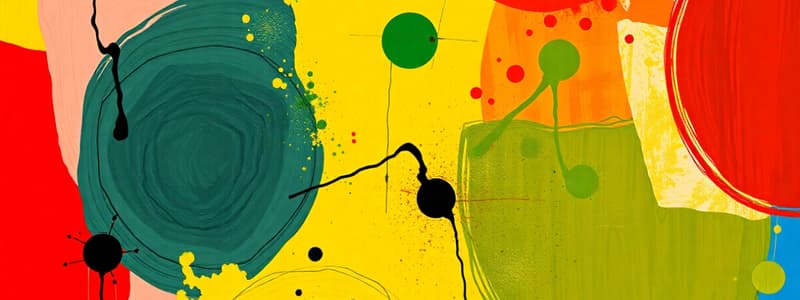Podcast
Questions and Answers
What is the primary subject of copyright ownership?
What is the primary subject of copyright ownership?
- The client commissioning the work
- The creator or maker of the work (correct)
- The general public's access to the work
- The educational institutions using the work
Under which conditions can copyright material be copied without permission?
Under which conditions can copyright material be copied without permission?
- Always, if it is for educational purposes
- If the owner permits or licenses it (correct)
- Only if it is been published for more than 40 years
- If the material is in the public domain (correct)
Which act governs the university's copyright practices?
Which act governs the university's copyright practices?
- Copyright Act 1985
- Digital Copyright Act 2002
- Copyright Amendment Act 1990
- Copyright Act 1968 (correct)
What is the legal duration of copyright protection for most works?
What is the legal duration of copyright protection for most works?
Which of the following statements about copyright infringement is true?
Which of the following statements about copyright infringement is true?
What happens to copyright when it expires?
What happens to copyright when it expires?
What should individuals do if they have specific queries regarding copyright?
What should individuals do if they have specific queries regarding copyright?
Which of these is NOT a right associated with copyright ownership?
Which of these is NOT a right associated with copyright ownership?
Who is responsible for sponsoring the student matters policy?
Who is responsible for sponsoring the student matters policy?
What is the date for the next major review of the policy?
What is the date for the next major review of the policy?
Which version of the policy indicates that Clause 5 was updated?
Which version of the policy indicates that Clause 5 was updated?
Which body holds the authority to approve the student matters policy?
Which body holds the authority to approve the student matters policy?
What significant change was made in version 15-1 of the policy?
What significant change was made in version 15-1 of the policy?
What is a characteristic of a voluntary licence in copyright usage?
What is a characteristic of a voluntary licence in copyright usage?
Which of the following constitutes fair dealing for literary works?
Which of the following constitutes fair dealing for literary works?
What does 'insubstantial portions' mean in the context of teaching uses of copyright material?
What does 'insubstantial portions' mean in the context of teaching uses of copyright material?
What is a requirement for making copies of copyright material for university teaching?
What is a requirement for making copies of copyright material for university teaching?
What is the maximum amount that can be copied under fair dealing rules for works longer than 10 pages?
What is the maximum amount that can be copied under fair dealing rules for works longer than 10 pages?
What should be done if extensive copying is needed beyond the allowed limits?
What should be done if extensive copying is needed beyond the allowed limits?
How long must university staff wait before making further copies of the same work under insubstantial provisions?
How long must university staff wait before making further copies of the same work under insubstantial provisions?
For what purpose is the university authorized to make multiple copies of copyright material?
For what purpose is the university authorized to make multiple copies of copyright material?
Which of the following can be copied under the agreement?
Which of the following can be copied under the agreement?
What constitutes a 'reasonable portion' for works over 10 pages?
What constitutes a 'reasonable portion' for works over 10 pages?
What happens if copies are made outside of the specified conditions?
What happens if copies are made outside of the specified conditions?
Which of the following statements is true regarding television and radio broadcasts?
Which of the following statements is true regarding television and radio broadcasts?
What identification is required on tapes or their containers used for copies?
What identification is required on tapes or their containers used for copies?
What is prohibited regarding the supply of copies for profit?
What is prohibited regarding the supply of copies for profit?
Under what condition can more than a reasonable portion of a work be copied?
Under what condition can more than a reasonable portion of a work be copied?
What is a key restriction on copying pre-recorded material?
What is a key restriction on copying pre-recorded material?
What is the basis for calculating charges for print material provided to award students?
What is the basis for calculating charges for print material provided to award students?
Which of the following statements is true regarding the copying of broadcast material for non-award short courses?
Which of the following statements is true regarding the copying of broadcast material for non-award short courses?
What is the purpose of sampling surveys mentioned in relation to copying agreements?
What is the purpose of sampling surveys mentioned in relation to copying agreements?
What restriction is placed on making back-up copies of computer programs?
What restriction is placed on making back-up copies of computer programs?
Who bears the financial responsibility for annual payments to CAL and AVCS?
Who bears the financial responsibility for annual payments to CAL and AVCS?
What does the Copyright Act say about computer programs?
What does the Copyright Act say about computer programs?
Which of the following resources can staff refer to for further copyright information?
Which of the following resources can staff refer to for further copyright information?
What scenario allows a legitimate owner of a computer program to create a back-up copy?
What scenario allows a legitimate owner of a computer program to create a back-up copy?
Flashcards are hidden until you start studying
Study Notes
Copyright Basics
- Copyright is a bundle of rights granted to the owner of a work, including publishing, copying, adapting, broadcasting, and performing the work.
- The owner is typically the creator, though it can be another person or entity under Australian copyright law.
- The University's Intellectual Property Policy addresses ownership of copyright.
- Exceptions exist for the use of copyrighted material, allowing for limited copying, licensing, or fair dealing.
Policy and Legislation
- The University follows the Copyright Act 1968 and relevant agreements regarding copyright.
- Copyright infringement using University resources is prohibited and carries individual and institutional liability.
Copyright Expiry
- Copyright generally lasts for 70 years after the creator's death or 70 years after first publication.
- For photos published after 1 January 2005, copyright lasts for 70 years from the end of the year the photographer died or 70 years after first publication.
- Photos taken before 1 January 1955 are in the public domain.
Copyright Use Without Infringement
- Voluntary Licenses: Copyright owners can grant permission to use their work through licenses, which may have restrictions on use.
- Fair Dealing: Individual staff or students can copy copyrighted material for research, study, or review under “fair dealing” guidelines.
- One article or a "reasonable portion" (10% of total pages or one chapter) can be copied for most works.
- More extensive copying may be allowed for research or study, but seek advice for specific situations.
University Use of Copyright
- The University is subject to statutory licensing for copying copyrighted material for teaching purposes.
- Insubstantial Portions (6.3.1): Two pages or 1% of a work can be copied for teaching.
- This is limited to a specific work and only on University premises, with a 14-day restriction on further copies.
- Copying an entire work less than two pages in length is not considered insubstantial.
- Multiple Copies (6.3.2): Under statutory licenses, the University can make multiple copies for teaching:
- One article in a periodical or more than one article on the same topic can be copied.
- Literary or dramatic works under 15 pages can be copied for inclusion in anthologies.
- A "reasonable portion" of longer works can be copied, and more may be copied if reasonable investigation shows new copies are unavailable at reasonable prices.
- Television and Radio (6.3.3): The University can copy all or part of broadcasts for educational purposes, unlimited by program type or number of copies.
- However, copying pre-recorded material (e.g., commercially purchased videos) is not permitted.
- All copies should be marked with the University name, a reference to Part VA of the Copyright Act, the date of broadcast, and the date of copying.
Administering Statutory Licenses
- The University has agreements with Copyright Agency Limited (CAL) for print materials and Audio-Visual Copyright Society Limited (AVCS) for broadcast materials.
- Charges for copying are based on EFTSU (Equivalent Full-Time Student Units) and random sampling of student usage.
- Departmental cooperation with sampling surveys is necessary to ensure the continuation of copying agreements.
Computer Programs
- The Copyright Act defines computer programs as literary works, but they are excluded from statutory licenses for educational copying.
- Legitimate owners of computer programs are allowed to make a back-up copy for use in place of the original if it is lost, destroyed or rendered unusable.
Further Information
- The AVCC (Australian Vice-Chancellors' Committee) provides guidance on copyright in "Copyright; A Comprehensive Guide for Higher Education" and "Copyright Bulletin".
- These materials are available through the University Library.
Studying That Suits You
Use AI to generate personalized quizzes and flashcards to suit your learning preferences.




